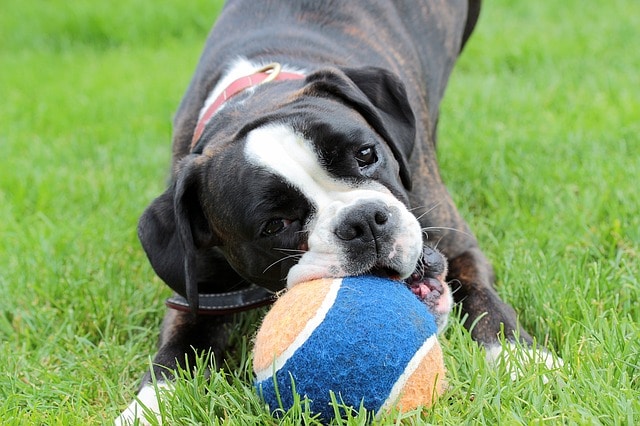Play biting is a natural dog behavior that is typically weaned out of dogs when they are growing up in a litter. However, puppies that grow up in human households are more prone to continue play biting into adulthood. Play biting may not be intentionally aggressive, but it can quickly turn to something more serious if left unchecked. The following is a guide that will help you learn how to stop your dog from exhibiting play biting behavior.
Set firm ground rules about biting
Dogs do not understand exceptions to the rules, so you must set firm ground rules about biting during playtime. Either biting is acceptable (which it shouldn’t be!) or it is not; so do not let your dog play bite some days but then punish them for it on other days. You must establish a firm ground rule: no biting.
Instantly stop playing and yelp when your dog uses their teeth
If you are playing with your dog and they use their teeth, you must do two things right away: immediately go limp and then give a high pitched yelp. This is intended to mimic the sound that other dogs would make if they were bit too hard during playtime. It is important that your yelp is distinct enough to make your dog realize that they have hurt you. Do not pull your hand or other part of your body away when your dog bites, however, as this can increase your chance of injury—especially with an adult dog—and may trigger your dog’s natural instinct to chase. If your dog’s teeth are still making contact, go limp, and wait for your dog to release.
Focus on no-contact forms of play
Some dogs have a more difficult time than others playing without biting. This can be mitigated by focusing on forms of play that don’t have physical contact, such as tug-of-war toys, fetch, and so on. These toys can help your dog release some energy and fulfill their desire to play around without giving them a chance to bite you during playtime.
Redirect your dog’s desire to bite and chew with appropriate toys
Play biting and chewing is a natural instinct for dogs. You can help redirect this instinct by giving them appropriate toys that they are allowed to bite and chew, such as bones and strong chew toys. Remember to keep these on hand during play sessions so that if you see your dog about to bite, you can put the toy in front of them. The more you do this, the more they will associate play biting with their chew toys—and not your hands.
Do not let family and friends encourage play biting
This is an important rule to follow: do not let your family or friends encourage play biting! This will be very confusing to your dog and can roll back months of training. Never let anyone who interacts with your dog break the rules regarding play biting.
Remember that while play biting is a natural behavior, it can turn serious if left unchecked; the above guidelines will help you teach your dog to stop play biting.
